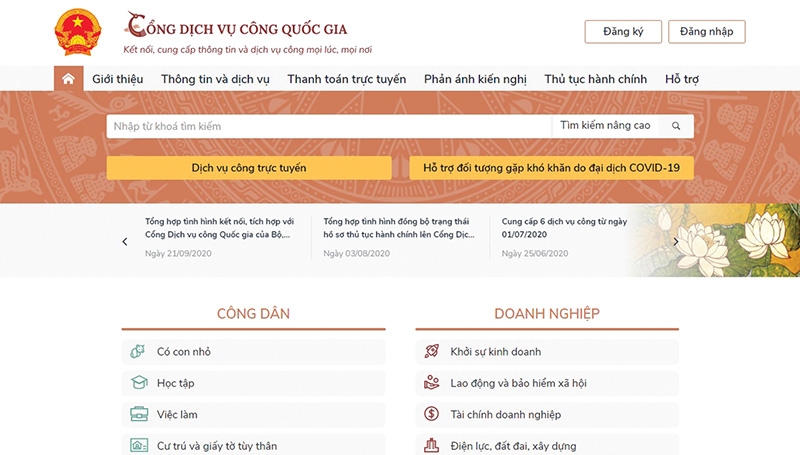Digital governance for better citizen services
 |
| Deputy Minister of Information and Communications Pham Anh Tuan |
The development of e-government and digital transformation is an important policy and orientation to which the Politburo, the government, and the prime minister have given drastic directions in recent times.
Some recent policies and orientations include Resolution No.52-NQ/TW from September 2019 on a number of policies on the nation’s proactive involvement in the Fourth Industrial Revolution; Resolution No.17/2019/NQ-CP from March 2019 on key tasks and solutions to develop e-government towards 2025; and Decision No.749/QD-TTg from this June approving the National Digital Transformation Programme by 2025, with orientations toward 2030.
In line with the policies and orientation, the government, ministries, agencies, and localities as well as the digital business community have been joining efforts in developing e-government as well as providing online-public services to better serve both individuals and businesses.
The strong efforts have brought about positive results thus far, thus creating the foundation for digital transformation so as to develop a digital government in the upcoming years in line with the directions of the Politburo and the government.
 |
| Digital governance aims to streamline services and offer open government data for citizens |
Vietnam’s ranking in e-government has continued to improve. According to the United Nations E-Government Survey 2020, Vietnam has climbed two places to rank 86th out of 193 countries. This reflects the country’s efforts over past years, although Vietnam still ranks only sixth among ASEAN nations.
In regard to online public service availability, the rate of offering online public services at Level 4 nationwide now reaches 19.1 per cent, up over 4-fold from 2018.
Of those, nine ministries and government agencies and 15 cities and provinces have a rate of over 30 per cent. They include the Ministry of Health and the Ministry of Information and Communications (MIC) which offers all Level 4 public services online. The country aims to increase the rate to at least 30 per cent by the end of this year.
Regarding future development orientations, 2020 marks the first time the United Nations has used the term “digital government”. This reflects the rapid advancements and changes of technologies in the ICT ecosystem such as social media, big data and the Internet of Things.
In the draft National Strategy on Development of Digital Government, the MIC defines the close link between the development of digital government with digital transformation and development of smart cities, cybersecurity, and national digital sovereignty.
In Vietnam, the orientation towards development of digital government began in Resolution 52 and in the National Digital Transformation Programme. Accordingly, the country aims to complete basic digital transformation in units of the Party, the state, the Vietnam Fatherland Front, and social-political organisations by 2025; and then will complete development of the country’s digital government by 2030.
To materialise the orientations, the ministry has built a draft of the National Strategy on Development of Digital Government in the 2021-2025 period, with a vision towards 2030. The ministry is preparing to submit it to the prime minister for approval and issuance.
| Digital government can play an important role in building effective, inclusive, and accountable institutions to support policy-making and service delivery for the Sustainable Development Goals, according to the United Nations. The transformation towards digital governance is the process of changing management thinking and the mindset of service delivery from providing what state agencies have to offer based on the needs of both individuals and businesses. The terms e-government and digital government both include the use of ICT for government services, with the latter emphasising the inclusion of newer ICT solutions such as big data, cloud computing, and the Internet of Things, as well as streamlined services and open data approaches provided by state agencies. However, several institutions use these terms interchangeably, while others differentiate and indicate different development stages. In addition, there also seems to be no consensus in academia about the specific differences of these terms. The 2020 ranking of the 193 UN member states for digital governments – capturing the scope and quality of online services, status of ICT infrastructure, and existing human capacity – is led by Denmark, South Korea, and Estonia followed by Finland, Australia, Sweden, the UK, New Zealand, and the United States. Among the least developed countries are Bhutan, Bangladesh, and Cambodia. |
What the stars mean:
★ Poor ★ ★ Promising ★★★ Good ★★★★ Very good ★★★★★ Exceptional
 Tag:
Tag:
Themes: Digital Transformation
- Dassault Systèmes and Nvidia to build platform powering virtual twins
- Sci-tech sector sees January revenue growth of 23 per cent
- Advanced semiconductor testing and packaging plant to become operational in 2027
- BIM and ISO 19650 seen as key to improving project efficiency
- Viettel starts construction of semiconductor chip production plant
Related Contents
Latest News
More News
- Hermes joins Long Thanh cargo terminal development (February 04, 2026 | 15:59)
- SCG enhances production and distribution in Vietnam (February 04, 2026 | 08:00)
- UNIVACCO strengthens Asia expansion with Vietnam facility (February 03, 2026 | 08:00)
- Cai Mep Ha Port project wins approval with $1.95bn investment (February 02, 2026 | 16:17)
- Repositioning Vietnam in Asia’s manufacturing race (February 02, 2026 | 16:00)
- Manufacturing growth remains solid in early 2026 (February 02, 2026 | 15:28)
- Navigating venture capital trends across the continent (February 02, 2026 | 14:00)
- Motivations to achieve high growth (February 02, 2026 | 11:00)
- Capacity and regulations among British areas of expertise in IFCs (February 02, 2026 | 09:09)
- Transition underway in German investment across Vietnam (February 02, 2026 | 08:00)






















 Mobile Version
Mobile Version